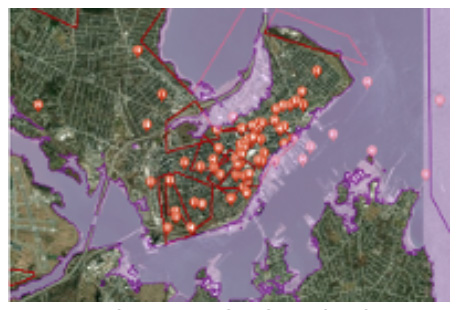The future of historic properties is often overlooked in the complex process of planning for the effects of climate change, yet they are also subject to the effects of erosion, high water, intense storms, high winds and wildfire. Much like parks or schools or town buildings, a community’s historic properties help create a unique sense of place. Community members, municipal officials, planners, preservationists, scientists and visionaries all need to be part of the discussion of how - and which – historic properties can be protected. Local values, demographics, culture and economics underlay the available and feasible options.
The Maine Historic Preservation Commission (MHPC) has established this page to assist entities throughout the state with planning for the effects of climate change on historic properties and cultural resources through the process identification, adaption, resiliency and mitigation. Additional information and resources will be posted as they are developed.
Guidelines on Flood Adaptation for Rehabilitating Historic Buildings
The National Park Service has developed and issued Guidelines on Flood Adaptation for Rehabilitating Historic Buildings.
"These Guidelines are designed to provide information on adapting historic buildings to be more resilient to flooding in a manner that will preservation their historic character and meet The Secretary of the Interior's Standards for Rehabilitation.... The Guidelines outline adaptation methods that lower the flood risk of a property. The goal of this document is to achieve greater resilience while minimizing the adaptation impacts to the historic character of a building. The Guidelines provide information concerning professional methods and techniques to ensure the preservation and rehabilitation of the historic properties.." (National Park Service)
Reports and Studies
Historic Properties and Climate Change Planning in Maine
Maine's Four-Year Plan for Climate Action (not specific to historic resources.)
MHPC Historic Properties Toolkit
Information on climate adaptation planning resources focused on historic properties will be posted here as they are developed.
Weathering Maine: Mapping Threats to Maine’s Historic and Cultural Resources
 This GIS map depicts the locations of properties in Maine listed in the National Register of Historic Places, National Historic Landmarks or museums/archives along with layers depicting potential threats to these properties including flood, fire, sea-level rise, storm surge. The map also shows current NOAA hazards and watches.
This GIS map depicts the locations of properties in Maine listed in the National Register of Historic Places, National Historic Landmarks or museums/archives along with layers depicting potential threats to these properties including flood, fire, sea-level rise, storm surge. The map also shows current NOAA hazards and watches.
The MHPC has developed this web application so that as communities, regions, officials and citizens create plans to deal with changing climate, storms, erosion, or other physical threats, historic properties, museums or archives within the subject areas can be identified, evaluated, and their futures contemplated. As irreplaceable, authentic touchstones to our past, these properties merit specialized consideration in the planning processes in order to protect the historic characteristics and associations that give them meaning.
Climate Change and Gutters White Paper
This white paper which studies the capacity of gutters on historic buildings during intense storm events was penned by Historic New England as part of their series Property Care White Papers. The study was supported in part with a federal Historic Preservation Fund Grant from the Commission.
White Paper: Climate Change and Gutters
For more information on property care visit Historic New England’s Property Care White Papers
Greater Portland Landmarks Staying Above Water Property Owner's Guide (PDF)
Disaster Planning
" The National Park Service along with several partner agencies and preservation nonprofits has developed guidance and tools for State, Tribal, and Local governments working with the federal government before and after a disaster. Asking the right person the right question at the right time can help spped the distribution of resources and technical assistance to disaster-impacted communities."
State Resources and Toolkits
**Just Released** Maine Community Resilience Workbook
Climate directory providing decision makers and assistance providers with the resources needed to become more resilient in the face of a changing climate. (Not specific to historic resources.)
A centralized source for the information relevant for designing and implementing climate adaptation measures or strategies. (Not specific to historic resources.)
The Maine Climate Council is an assembly of scientists, industry leaders, bipartisan local and state officials, and engaged citizens working to address the effects of climate change on our state. (Not specific to historic resources.)
Resources from other states and organizations
Flood Mitigation Guide: Maryland’s Historic Buildings (PDF) Preservation Design Partnership, 2018.
This book is designed to help bridge the gap between floodplain management, emergency management, climate adaptation, and historic preservation. It discusses the steps of the emergency management cycle: planning, response, recovery, mitigation, and adaptation, and at its core is geared towards starting conversations between local stakeholders.
- Treatment of Flood-Damaged Older and Historic Buildings (PDF) (National Trust for Historic Preservation)
- Tips for Drying Out a Water-Damaged Building (North Carolina State Historic Preservation Office)
- Video: Drying Out Water Damaged Buildings (North Carolina State Historic Preservation Office)
- Before You Repair Flood Damage: Important information for Historic Building Owners & Municipalities (PDF) (Vermont Department of Economic Housing and Community Development Department of Environmental Conservation)
- Brief Guide to Understanding Repairs to Historic Homes Damaged by Hurricane Katrina and Other Related Floods (PDF) (Mike Logan)
- Flood Damage in Historic Buildings (Tim Hutton and Christopher Marsh)
- American Institute for Conservation of Historic and Artistic Works – Collections Emergency Response Team (AIC-CERT)
- Repairing Your Flooded Home (PDF) (American Red Cross, FEMA)
- After the Flood: Rehabilitating Historic Resources (PDF) (Georgia State Historic Preservation Office)
- Cemetery Disaster Planning (PDF) (Chicora Foundation, Inc.)
- What to Do When Disaster Strikes Historic Cemeteries (National Center for Preservation Technology and Training)
- Emergency Drying Procedures for Water Damaged Collections (Library of Congress)
- Salvage Operations for Water Damaged Collections (Betty Walsh)
- Salvage Operations for Water Damaged Archival Collections: A Second Glance (Betty Walsh)